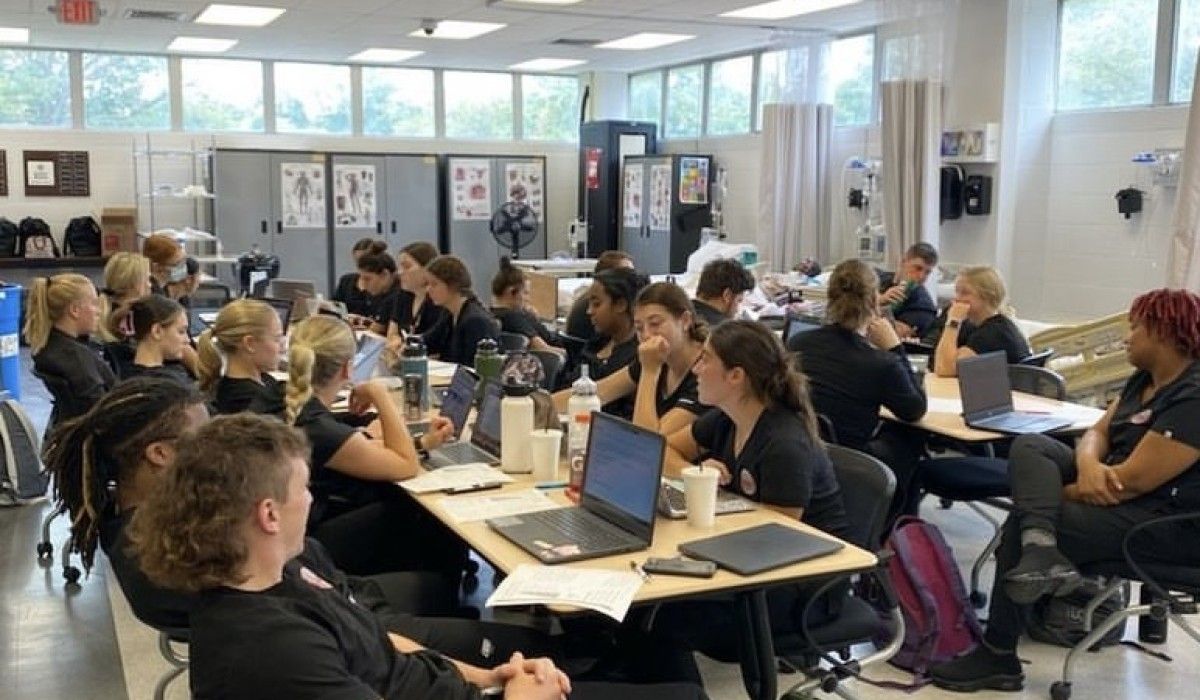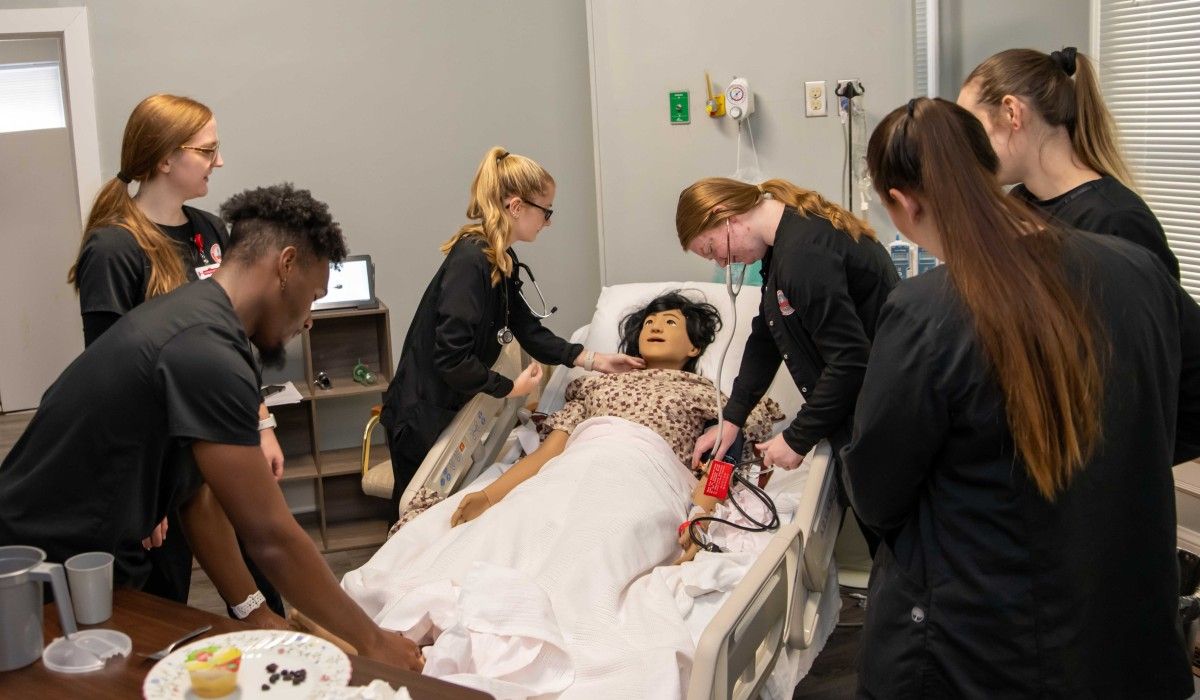After nearly five years of conditional approval and annual progress reporting with on-site visits to ensure that the implementation of Wittenberg’s Bachelor of Science in Nursing (BSN) has followed the laws of the Ohio Administrative Code Chapter 4723-5 for nursing education programs in the state, full approval has been granted by the Ohio Board of Nursing (OBON) to Wittenberg’s program.
The action confirms that the BSN program is following Chapter 4723-5 Ohio Administrative Code, Law and Rule pertinent to prelicensure nursing education programs in the state. Now, candidates who wish to sit for the National Council Licensure Examination (NCLEX®-RN), may do so as graduation from an approved nursing program is required.
“Special thanks to the Wittenberg administration, faculty and staff, nursing students, and the first graduating class of Wittenberg nurse. We could not have earned this full approval without you,” said Marie Bashaw, professor and director of nursing. Joining Bashaw in celebrating this new are fellow team member Cherie Rebar, professor of nursing; Stacy Gilson, nursing resource center and simulation laboratory coordinator, and professor of practice; Anita Oren, professor of practice; Catherine Short, professor of practice; Michelle Yeager, professor of practice; and Deborah Edwards, academic administrative assistant.
Bashaw explained that seeking approval from OBON involves several steps. The desired outcome of following these steps is for the program to earn full approval.
- Step 1: The proposed program must submit a “Letter of Intent” to OBON, describing the intention to offer a prelicensure nursing program. Once the OBON receives the letter, it verifies the program administration qualifications and requires that a “New Program Proposal” be submitted containing full plans for delivering the program, including target market, planned strategy for operations, curriculum, policies, proposed evaluation plan, clinical contractual relationships, faculty responsibilities, and a program maintenance plan. OBON often conducts an on-campus survey to ensure that resources are adequate, and then votes to determine if the proposed program can be granted conditional approval to begin operations. Wittenberg filed information associated with the ‘Letter of Intent’ and ‘New Program Proposal’ requirements in 2017. OBON granted conditional approval in January 2018 and conducted a site visit in March 2018.
- Step 2: Once the program is granted conditional approval, recruitment and program delivery can begin. Periodic updates or progress reports are due to OBON commenting on the status of the implementation process. Wittenberg was granted conditional approval by OBON and began recruitment and program implementation in the 2018-2019 academic year. Bashaw filed annual progress reports every summer to keep OBON apprised of the implementation progress and achievements.
- Step 3: When the first cohort is approaching graduation, OBON conducts another on-campus survey visit to ensure that the program has consistently been adhering to Ohio Administrative Code Chapter 4723-5. The survey visit took place in March 2022.
- Step 4: After the survey visit and the first class has graduated, OBON votes on the status of that program during its early fall meeting. OBON met on Sept. 15, 2022 and voted that Wittenberg’s program be granted full approval for a period of two years.
Every two years the Ohio Board of Nursing will continue to survey the nursing program to ensure continued compliance with Chapter 4723-5 Ohio Administrative Code.
The nursing program’s mission, guided by the American Association of Colleges of Nursing’s Essentials of Baccalaureate Education for Professional Nursing Practice (2008) and underscored by AACN’s Essentials: Core Competencies for Professional Nursing Education (2021), is to prepare students with a liberal arts education for baccalaureate generalist nursing practice, to provide a foundation for graduate education, and to prepare students to pass forward the light as nursing leaders who meet the health needs of a dynamic and changing world. The baccalaureate degree program in nursing at Wittenberg University is accredited by the Commission on Collegiate Nursing Education.
In 2021, for the 20th year in a row, the public rated nursing as the most honest and ethical profession in America according to the results of a Gallup survey released in January 2022. These numbers are important because they contextualize and complement findings that show that patients benefit when nurses are leading and working to the fullest extent of their licensure.
Interim provost and professor of education Brian Yontz noted, “the deliberate work of Marie Bashaw and her team has led to the OBON to grant this full approval without any interim reporting before the next approval period. This external recognition confirms what we know of the faculty and staff of our Nursing program. They do outstanding work for our students, our academic program, and within the health care systems in the Springfield, Ohio region.”
Other positive news for Wittenberg’s nursing program includes the Wittenberg Board of Directors approving the addition of a new post-master's certificate in nursing education. The program, which will be offered fully online, prepares individuals to be nurse educators and expert scholars who teach the next generation of nurses grounded in evidence-based knowledge and focused on health outcomes, with classroom leadership and management skills.
Organizations such as the Institute of Medicine, Robert Wood Johnson Foundation, and The Joint Commission (TJC) have called for radical transformation in educational programs and processes that serve to prepare healthcare providers of tomorrow (AACN, 2019a). The missing link is the number of nursing faculty members that are educationally prepared and ready to answer this call.
Currently there is a national demand for nurse educators in response to continuing growth in anticipated need for nurses (who must be taught by nurse educators), the current numbers of students seeking nursing education, the current scarcity of nursing faculty, and the continued number of retiring faculty in nursing programs. This demand supports the development and implementation of a post master’s certificate in nursing education at Wittenberg University. Approval by the Ohio Department of Higher Education has been received. The University is targeting enrollment for its first class in Spring 2023.
“This post-master’s teaching certificate will close the knowledge gap for nurses who are making the transition from direct patient care to educating the next generation of nurses,” Bashaw said. “Nurses targeted for this certificate have a master’s or doctoral degree in nursing already. This program can benefit hospital-based educators as they support the direct care nurses, educating them on new procedures, policies, and processes. It also benefits nurses moving from direct care environments to academia, giving them the building blocks for how to develop curriculum, active learning strategies, teaching plans, evaluation, and assessment.”
Nationwide, the number of academic nurse educators is far below the number needed to meet the need of students applying to nursing programs. Nursing programs are turning away qualified applicants because of the lack of qualified faculty. In 2020 (the most recent data available), 66,274 students were rejected from entry into a prelicensure baccalaureate nursing program (AACN, 2021). The top two reasons for rejection were the lack of nurse educators, and the lack of clinical sites.
“The nursing faculty felt this program would help the new full-time educators and adjunct faculty increase their knowledge and enhance their ability to convey necessary knowledge to students and to new nurses in hospitals,” Bashaw added.
Wittenberg will offer two classes for this program each semester, in spring, summer, and fall. Nurses with a master’s or doctoral degree in nursing may enroll at any time and complete the program in one year.
Reference - https://www.aacnnursing.org/News-Information/News/View/ArticleId/25043/…








